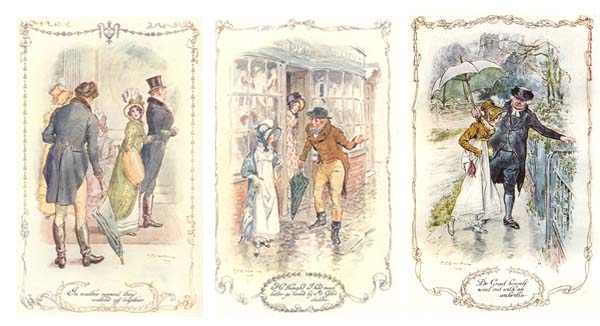Cookery for the Poor
Though now the middle of December, there had yet been no weather to prevent the young ladies from tolerably regular exercise; and on the morrow, Emma had a charitable visit to pay to a poor sick family, who lived a little way out of Highbury...Emma was very compassionate; and the distresses of the poor were as sure of relief from her personal attention and kindness, her counsel and her patience, as from her purse. She understood their ways, could allow for their ignorance and their temptations, had no romantic expectations of extraordinary virtue from those, for whom education had done so little; entered into their troubles with ready sympathy, and always gave her assistance with as much intelligence as good-will. In the present instance, it was sickness and poverty together which she came to visit; and after remaining there as long as she could give comfort or advice, she quitted the cottage with such an impression of the scene as made her say to Harriet, as they walked away, "These are the sights, Harriet, to do one good. How trifling they make every thing else appear! I feel now as if I could think of nothing but these poor creatures all the rest of the day; and yet, who can say how soon it may all vanish from my mind?" "Very true," said Harriet. "Poor creatures! one can think of nothing else." "And really, I do not think the impression will soon be over," said Emma, as she crossed the low hedge, and tottering footstep which ended the narrow, slippery path through the cottage garden, and brought them into the lane again. "I do not think it will," stopping to look once more at all the outward wretchedness of the place, and recall the still greater within. -EmmaIn 1806, Eliza Maria Ketelby Rundell (known to her readers as Mrs. Rundell) published a book of cookery and household hints entitled, A New System for Domestic Cookery, formed upon Princlples of Economy, and adapted to the Use of Private Families. First directed towards her own daughters, and designed for the many young ladies who found themselves mistresses of their own homes in the ever growing Regency middle class. In her prefec to the 1814 edition, she writes:
THOSE deserve the greatest praise,-who best acquit themselves of the duties which their stations require. Indeed, this line of conduct is not a matter of choice but of necessity, if we would maintain the dignity of our character as rational beings. In the variety of female acquirements though domestic occupations stand not so high in esteem as they formely did, yet, when neglected, they produce much human misery. There was a time when ladies knew nothing beyond their own family concerns; but in the present day there are many who know nothing about them. Each of these extremes should be avoided: but is there no way to unite, in the female character, cultivation of talents and habits of usefulness? Happily there are still great numbers in every situation, whose example proves that this is possible. Instances may be found of ladies in the higher walks of life, who condescend to examine the accounts of their house-steward; and, by overlooking and wisely directing the expenditure of that part of their husband’s income which falls under their own inspection, avoid the inconveniencies of embarrassed circumstances. How much more necessary, then is domestic knowledge in those whose limited fortunes press on their attention considerations of the strictest economy! There ought to be a material difference in the degree of care which a person of a large and independent estate bestows on money-concerns, and that of a person in confined circumstances: yet both may very commendably employ some portion of their time and thoughts on this, subject. The custom of the times tends to prevent or to abolish the distinction of ranks: and the education given to young people, is nearly the same in all : but though,‘ the leisure of the fashionable may be devoted to different accomplishments, the pursuits of those in a middle line, if less ornamental, would better secure their own happincss and that of others connected with them. We sometimes bring up children in a manner calculated rather to fit them for the station we wish, than that which fit is likely they will actually possess: and it is in all cases worth the while of parents to consider whether the expectations or hope of raising their offspring above their own situation be well-founded.
Elizabeth soon perceived that though this great lady was not in the commission of the peace for the county, she was a most active magistrate in her own parish, the minutest concerns of which were carried to her by Mr. Collins; and whenever any of the cottagers were disposed to be quarrelsome, discontented or too poor, she sallied forth into the village to settle their differences, silence their complaints, and scold them into harmony and plenty.One likes to think that Jane, especially as daughter of the Clergyman of Steventon, would have been much more like Emma in her charitable ministrations, though whether she held them in the same view as Mrs. Rundell, can only be left to the immagination: General Remarks and Hints I promised a few hints, to enable every family to assist the poor of their neighbourhood at a very trivial expense; and these may be varied or amended at the discretion of the mistress. Where cows are kept, a jug of skimmed milk is a valuable present, and a very common one. When the oven is hot, a large pudding may be baked, and given to a sick or young family: and thus made the trouble is little:—Into a deep coarse pan put half a pound rice, four ounces of coarse sugar or molasses, two quarts of milk, and two ounces of dripping ; set it cold into the oven. It will take a good while, but be an excellent solid food.
A very good meal may be bestowed in a thing called brewis which is thus made:—Cut a very thick upper crust of bread, and put it into the pot where salt beef is boiling and near ready: it will attract some of the fat, and when swelled out, will be no unpalatable dish to those who rarely taste meat.
A Baked Soup Put a pound of any kind of meat cut in slices; two onions, two carrots, ditto; two ounces of rice, a pint of split peas, or whole ones if previously soaked, pepper and salt, into an earthen jug or pan, and pour one gallon of water. Cover it very close, and bake it with the bread.The cook should be charged to save the boiling of every piece of meat, ham, tongue, &c. however salt: and it is easy to use only a part of that, and the rest of fresh water, and by the addition of more vegetables, the bones of the meat used in the family, the pieces of meat that come from table on the plates, and rice, indian meal or barley, there will be some gallons of nutritious soup two or three times a-week. The bits of meat should be only warmed in the soup, and remain whole; the bones, &c. boiled till they yield their nourishment . If the things are ready to put in the boiler as soon as the meat is served, it will save lighting fire, and second cooking. Take turnips, carrots, leeks, potatoes, the outer leaves of lettuce, celery, or any sort of vegetable that is at hand; cut them small, and throw in, with the thick part of peas, after they have been pulped for soup, an grits of coarse oatmeal which have been used for gruel. Should the soup be poor of meat, the long boiling of the bones, and different vegetables, will afford better nourishment than the laborious poor can obtain; especially as they are rarely tolerable cooks, and have not fuel to do justice by what they buy. But in every family there is some superfluity; and if it be prepared with cleanliness and care, the benefit will be very great to the receiver, and the satisfaction no less to the giver. I found, that in the time of scarcity, ten or fifteen gallons of soup could be dealt out weekly at an expense not worth mentioning, though the vegetables were bought. If in the villages about London, abounding with opulent families, the quantity of ten gallons were made in ten gentlemen's houses, there would be a hundred gallons of wholesome agreeable food given weekly for the supply of forty poor families, at the rate of two and a half gallons each. What a relief to the labouring husband, instead of bread and cheese, to have a warm, comfortable meal! To the sick, aged, and infant branches, how important an advantage! Nor less the industrious mother, whose forbearance from the necessary quantity of food, that others may have a larger share, frequently reduces that strength upon which the welfare of her family essentially depends. It very rarely happens that servants object to seconding the kindness of their superiors to the poor; but should the. cook in any family think the adoption of this plan too troublesome, a gratuity at the end of the winter might repay her, if the love of her fellow creatures failed of doing it a hundred fold. Did she readily enter into it, she would never wash away, as useless, the peas &tc. of which soup or gruel had been made; broken potatoes, the green heads of celery, the Decks and feet of fowls, and particularly the shanks of mutton, and various other articles which in preparing dinner for the family are thrown aside.


